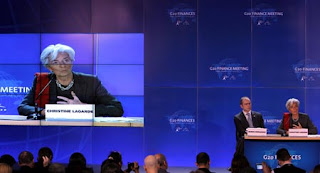An African Chair of the IMF? – The BRICS have missed their opportunity
French IMF Chair hopeful Christine Lagarde hopes to win over China's support for IMF chair bid.
Dr. Sven Grimm
Centre for Chinese Studies
Stellenbosch University
Timing counts for a lot in politics. Decision time for the new chair of the International Monetary Fund (IMF) will soon be upon us- in fact the final day for nominations is today, 10 June- but has it all come too suddenly? The IMF chair, Dominique Strauss-Kahn, has stepped down under unfortunate circumstances, but not really surprisingly so. His resignation was, in fact, a foreseeable development – even if the reason for it was not. Mr. Strauss-Kahn was eyeing a candidacy for the French Presidency. As chair of the IMF, he could not campaign in France simultaneously. So the fact that a new head of the IMF has to be chosen around June was known.
This was the moment for the BRICS (Brazil, Russia, India, China and South Africa) to throw a candidate into consideration. Reforms of the Bretton Woods institutions – comprising the World Bank Group and the IMF – feature high on the agenda of emerging countries and not least so the BRICS countries. Traditionally, the World Bank President is a North American, while the Europeans routinely claim the chair of the IMF to one of theirs (In the only case where the World Bank President was originally not American, Australian-born James Wolfensohn changed nationality.)
Admittedly, the global political dynamics are far from easy for the BRICS to launch an own candidate: With the Euro-Crisis, Europe is unlike to cede the post easily, and French Finance Minister Christine Lagarde is already on the global tour for her candidacy to the helm of the IMF. She is a very strong candidate: her credentials are respectable and, additionally, a women president of the IMF would be first. And power is far from the least factor speaking for Mme Lagarde: the group of industrialised countries (G7) account for more than 40% of shares in the IMF, while the BRICS states jointly hold only around 10% of the IMF share. Despite the basic maths, a BRICS candidate would arguably have stood an outsider chance – had the group moved quickly. A good surprise candidate could have created momentum for the BRICS. The IMF claims to work ‘for global growth and economic stability’. If Western states are serious about this mandate: that is certainly something that emerging economies know about in a hands-on manner.
Within these parameters, the best surprise candidate for the BRICS with appeal to a broader support would most likely be a competent candidate from Africa for at least two reasons.
First, a South African candidate would have had a broad appeal within and beyond the BRICS. For many years, the IMF – together with the World Bank – was the by-word for the ‘structural adjustment policies’ of the 1980s, those often associated with ‘Western’ dominance in Africa. While politically bloated bureaucracies on the African continent were indeed a point to remedy, stripping states of capacities was an obviously misguided policy angle that needed ‘readjusting’ itself. The policies were indeed changed, but bad images are sticky. A Chinese candidate is probably not yet politically digestible to Europeans, and even less so for the US, the de facto veto power in the IMF. An Indian candidate might not quite be to the liking of China, given the simmering rivalry between the two Asian giants. A Russian chair of the IMF is also unlikely, with the country having a patchy reputation in the West. What about a Brazilian candidate? Well, possible, but not all that catchy, actually. A competent African would have been an excellent choice, given that the African continent suffered most visibly from ‘structural adjustment’ à la Bretton Woods which remains a sore spot where the IMF needs to improve its credential.
Secondly, a South African candidate would have been the most likely-to-succeed candidate for reasons related to dynamics within the BRICS: Within the BRICS, the country with most symbolic value also for other BRICS states would be South Africa. China is keen to present itself as the true partner to developing countries, not least so in Africa. That was the point of inviting South Africa to the BRICS table in the first place. China could support a South African candidate as litmus test to its partnership with Africa. A successful colleague candidate from ‘the South’ would increase Chinese credibility tremendously on the African continent. At the same time, bickering amongst the heterogeneous BRICS group re: choosing a candidate might be limited if selecting a person from the smallest of the member states, South Africa.
In any case, given the current voting rights, only a surprise move with a competent candidate would have had enough momentum to stand the outsider chance. The BRICS would have had to be united behind a strong choice and would have needed to convince the big shots in the IMF as well as numerous small shareholders; mere power-play would always be doomed to fail under the current conditions. Trevor Manuel might have been an excellent choice with a possible outsider chance here! It would have been hard to resist a truly good candidate brought forward at the right time, not least so because Western countries have declared the informal fiefdoms of Europe and the US within the Bretton Woods institutions as outdated themselves. Yet, with the current speed of ‘coordination’ among the BRICS and Christine Lagarde already making her case – not unappealingly so –, the BRICS collectively seem to have blown their first real opportunity to make an impact beyond family pictures taken at summits.


Comments
Post a Comment